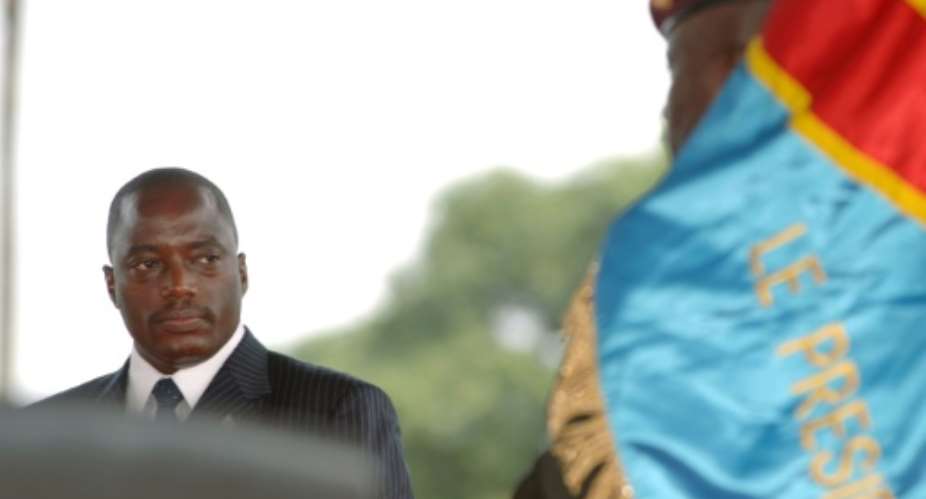Kinshasa (AFP) - DR Congo President Joseph Kabila gave the green light Wednesday for the Catholic Church to pursue mediation to end the crisis sparked by his refusal to step down, sources said.
The country's influential bishops brokered a New Year's Eve deal to sketch a timetable under which Kabila will stay in office before new elections are held in late 2017, in a bid to prevent more bloodshed in a crisis that has already claimed dozens of lives.
"Things are clear after the exchange between the bishops and the president, who asked them to do everything to implement the deal," a clerical source told AFP.
A close aide to the president confirmed that Kabila had met with the bishops but declined to give details of their discussions.
The president, who has been in power since 2001, was due to step down on December 20 at the end of his second and final mandate, but has shown no signs of wanting to leave office.
Scores of people have been killed in clashes before and since the deadline, with the Church leading efforts to reach a deal between the government and opposition on a way out of the crisis.
On Tuesday the ruling coalition said Kabila should have the right to approve Catholic mediation to haul the vast country out of a dangerous impasse, warning it might otherwise not join negotiations.
The bishops had asked both the government and opposition to submit written proposals Wednesday on arrangements for issues including the naming of a new prime minister and the size of the government.
Until the elections now due at the end of next year, a transitional body will be set up, headed by 84-year-old opposition leader Etienne Tshisekedi, and a prime minister will be named from opposition ranks.
Christophe Lutundula, who signed the agreement for the opposition, said the next talks would be about "specific arrangements" for the transitional body, named the National Council for Overseeing the Electoral Agreement and Process (CNSAP).
Issues include methods for appointing CNSAP's 28 members and "the composition of the (transitional) government," Lutundula told AFP.
Kabila took office after his father Laurent was assassinated in 2001 at the height of the Second Congo War.
He was confirmed as leader in 2006 during the first free elections since independence, and re-elected for a second term in 2011 in a vote marred by accusations of fraud.
Endowed with natural resources but chronically poor, sapped by corruption and politically unstable, the Democratic Republic of Congo has never witnessed a peaceful transfer of power since it gained independence from Belgium in 1960.
The former colonial ruler has joined others in the international community in piling pressure on the political factions to stick to the agreement.





 Meta releases new version of conversational AI across its platforms
Meta releases new version of conversational AI across its platforms
 Cape Town named Africa’s Best Airport 2024 by Skytrax
Cape Town named Africa’s Best Airport 2024 by Skytrax
 Bono East: Four injured after hearse transporting corpse crashes into a truck
Bono East: Four injured after hearse transporting corpse crashes into a truck
 ‘Be courageous, find your voice to defend our democracy’ — Sam Jonah urges journ...
‘Be courageous, find your voice to defend our democracy’ — Sam Jonah urges journ...
 Exodus of doctors, nurses and teachers have worsened because of unserious Akufo-...
Exodus of doctors, nurses and teachers have worsened because of unserious Akufo-...
 2024 election: Avoid insults, cutting down people in search of power – National ...
2024 election: Avoid insults, cutting down people in search of power – National ...
 ‘You passed through the back door but congratulations’ — Atubiga on Prof Jane Na...
‘You passed through the back door but congratulations’ — Atubiga on Prof Jane Na...
 Government’s $21.1 billion added to the stock of public debt has been spent judi...
Government’s $21.1 billion added to the stock of public debt has been spent judi...
 Akufo-Addo will soon relocate Mahama’s Ridge Hospital to Kumasi for recommission...
Akufo-Addo will soon relocate Mahama’s Ridge Hospital to Kumasi for recommission...
 We must not compromise on our defence of national interest; this is the time to ...
We must not compromise on our defence of national interest; this is the time to ...
